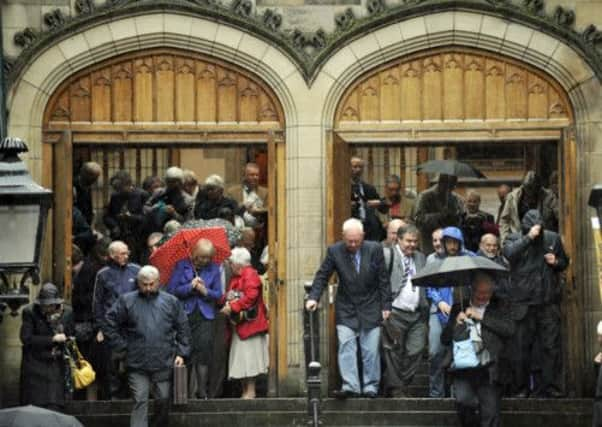Eyewitness: Passion and pleading as Kirk collides


More than 700 ministers and elders, known as commissioners, gathered to vote on one of the most divisive issues the Kirk has faced in recent times.
Apparently uneasy over engaging with the conflicting theological issues around ordination at an early stage, the commissioners used the morning session to question the legal implications and debated the intricacies of proposed amendments in great detail.
Advertisement
Hide AdAdvertisement
Hide AdDuring the morning, the Right Rev Lorna Hood, the new Moderator, implored the General Assembly to remember that “our convictions must never become blind passion, or dare I say, lead us to separate one from another”.
Traditionalist and revisionist theologies clashed throughout the lengthy afternoon session, as the commissioners sought to establish common ground.
The Very Rev Dr John Cairnes made an impassioned plea for the withdrawal of his own proposed third option, which would have allowed congregations no say in being allocated a minister in a same-sex relationship.
He said: “Discrimination against persons in a civil partnership should be removed in a qualified way, as was discrimination in suffrage against women.
“Today we are confronted with another barrier that many of us would like to see the Church of Scotland taking a leading role in breaking down.
“We can rejoice in the gift that makes us the way we are.”
Mr Cairnes said he was changing his view to support the liberal option of appointing ministers in same-sex relationships, whilst allowing congregations to opt out if they choose.
His contribution was met with prolonged applause, and his original proposal was successfully withdrawn.
Following Mr Cairnes’ speech, the Very Rev Albert Bogle tabled a last-minute counter-motion, successfully treading a path of compromise between traditional positions and modern pressures, or, as he reflected, “an enlightened bridge for the revisionist cause”.
Advertisement
Hide AdAdvertisement
Hide AdVisibly emotional, Mr Bogle claimed to have a “very traditionalist view”.
He told the General Assembly: “I love the scriptures. And I love reading what I’ve been taught since I was a child.
“I speak for people in this room who it’s even painful to talk of these things. But we might be wrong.”
The new proposal, he argued, was permissive and allowed congregations to opt in or out, whilst affirming the position of the Church of Scotland in the historic tradition of the Kirk.
Mr Bogle’s proposed compromise did not sit as well with those possessing staunchly held views.
Fiona Cameron voiced her rejection of the revisionist proposals, saying it was a “serious matter before us”.
She said she was not speaking about sexual orientation but the act of copulation between people of the same sex.
She said: “The Bible does not anywhere endorse same-sex activity as pleasing to God.
Advertisement
Hide AdAdvertisement
Hide Ad“We are turning our backs on scripture; throwing it out because of what society says. God does not use men and women to change the Bible. We must not get that the wrong way around.”
She said her sons had left the Church of Scotland because they felt it had “departed from scripture”.
The Rev Jim Sharp challenged people to ask themselves when they decided to be straight, in a reference to the idea that people choose to be gay.
Lesbian, gay, bisexual and transgender people were, he said, “made by God in the image of God and are loved by God”.
The Rev Elisabeth Spence, of Glasgow, similarly urged the Assembly to back same-sex ordination, which she said concerned her personally as a gay woman.
She said: “From 1994, it’s been debated: am I accepted in this Church or not, because I am a gay woman? Because it undermines my very call, it undermines my place with God? It’s now time, it’s time to decide, so that those of us who are in limbo can get under the wire.”
Yesterday’s approval of Mr Bogle’s motion is likely to prompt much impassioned debate about how traditionalist attitudes in the Church of Scotland are likely to shift in the future, and how fundamental and modern attitudes will be forced to co-exist.